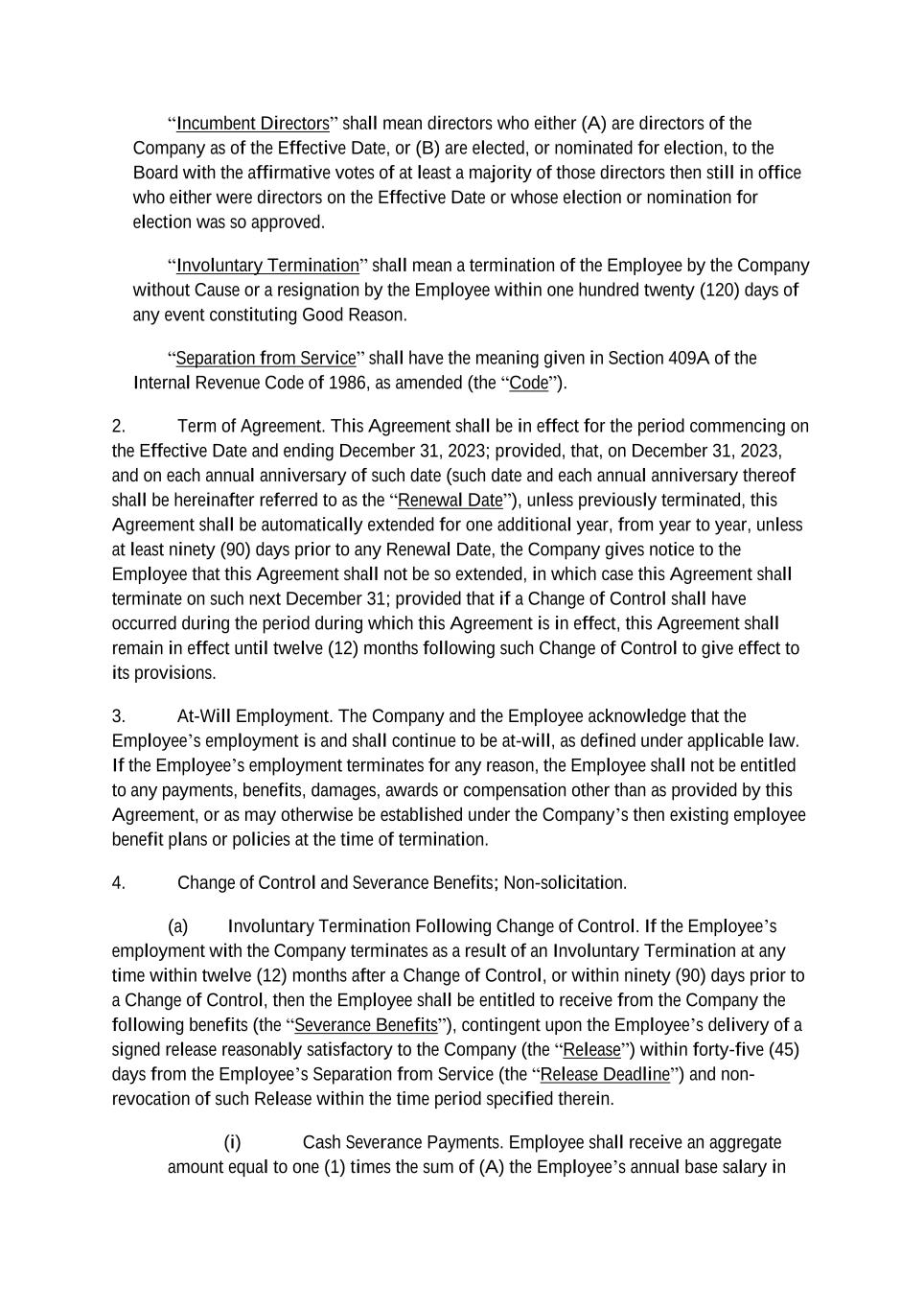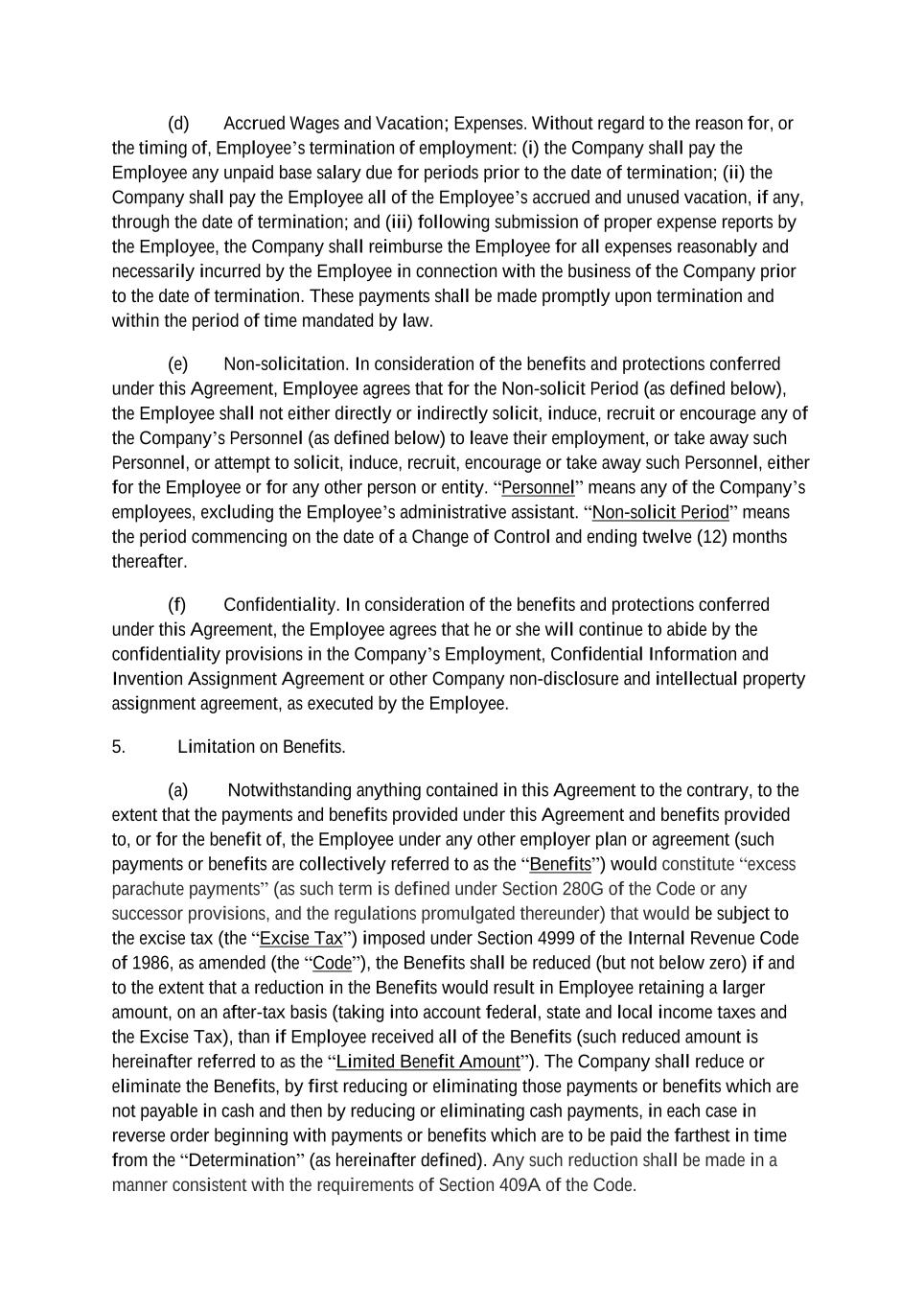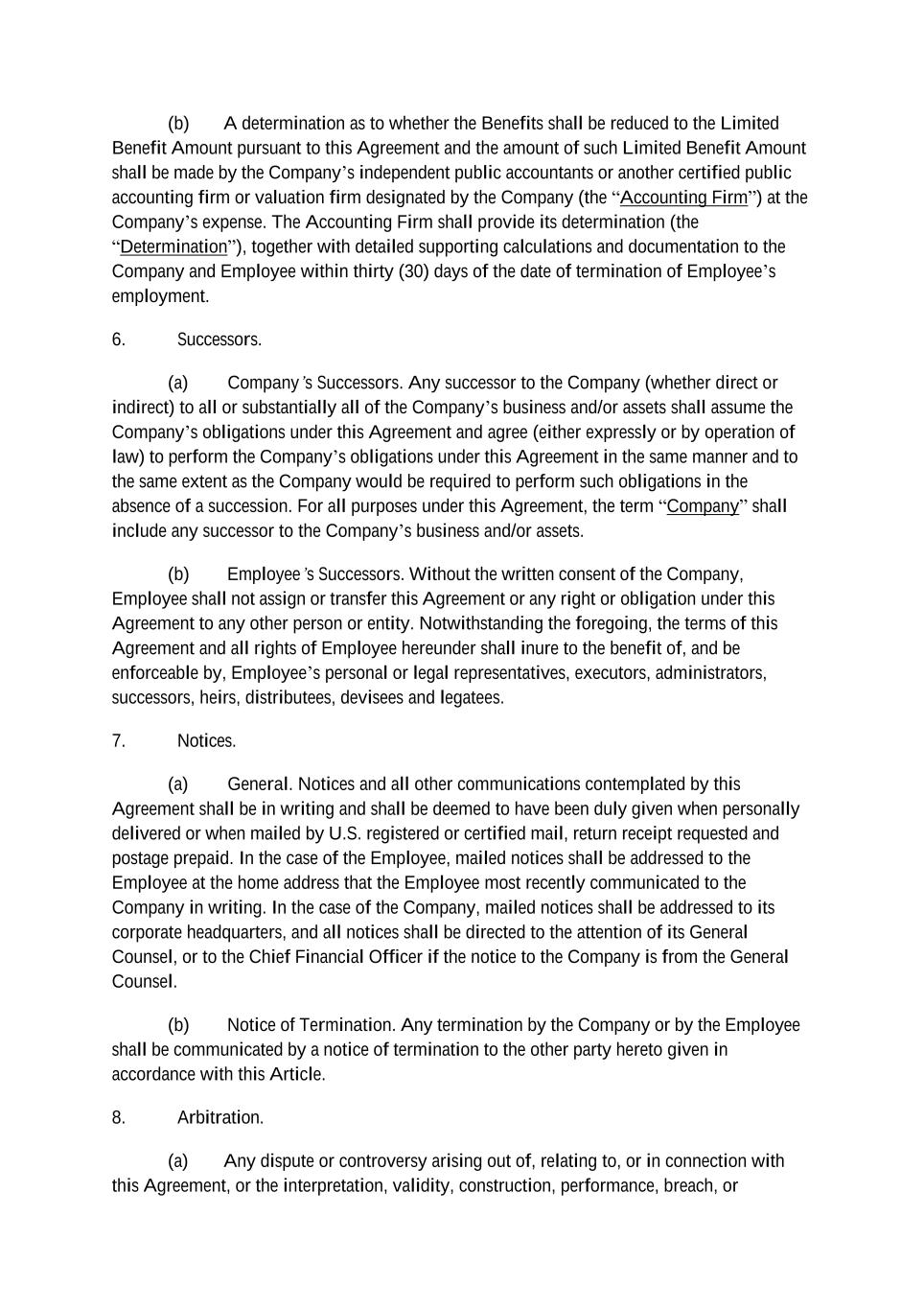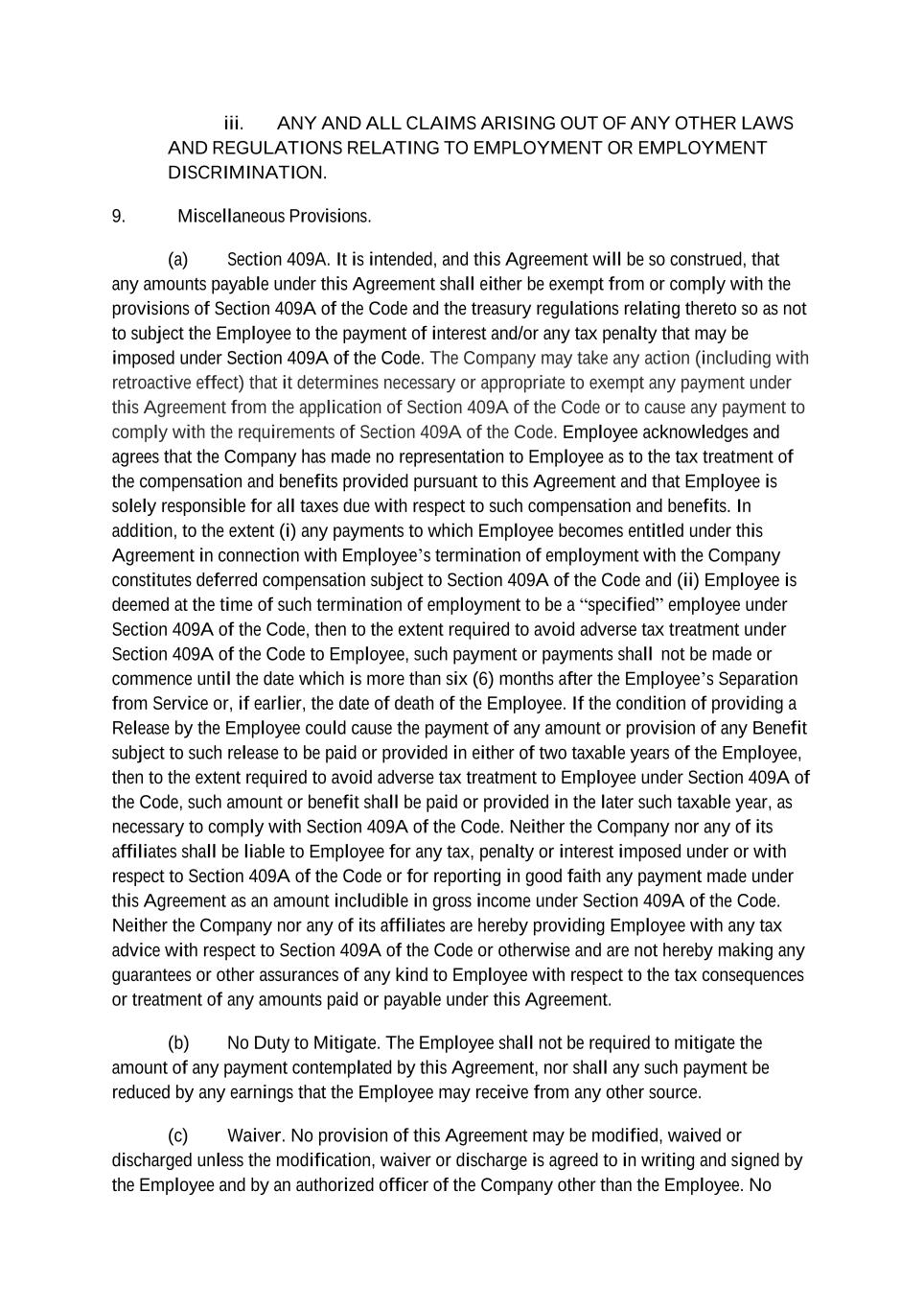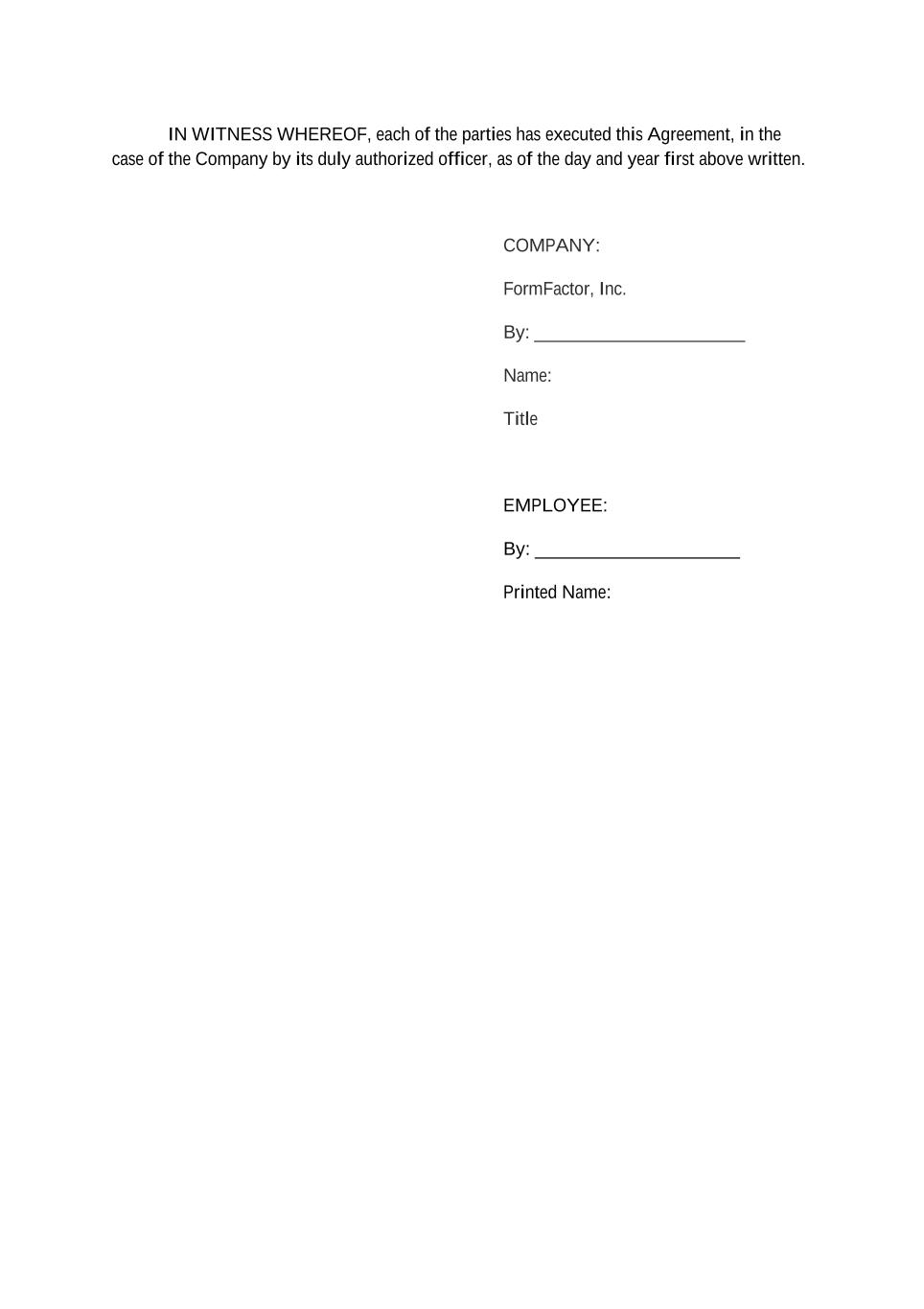FORMFACTOR, INC. CHANGE OF CONTROL SEVERANCE AGREEMENT This Change of Control Severance Agreement (the “Agreement”) is made and entered into effective as of [DATE] (the “Effective Date”), by and between the undersigned employee (the “Employee”) and...

FORMFACTOR, INC. CHANGE OF CONTROL SEVERANCE AGREEMENT This Change of Control Severance Agreement (the “Agreement”) is made and entered into effective as of [DATE] (the “Effective Date”), by and between the undersigned employee (the “Employee”) and FormFactor, Inc., a Delaware corporation (the “Company”). RECITALS A. The Company considers it essential to the best interests of its shareholders to xxxxxx the continuous employment of key management personnel. B. The Board of Directors of the Company (the “Board”) recognizes that, as is the case with many publicly held corporations, the possibility of a Change in Control (as defined below) exists and that such possibility, and the uncertainty and questions which it may raise among management, could result in the departure or distraction of management personnel to the detriment of the Company and its shareholders. C. The Board has determined that appropriate steps should be taken to reinforce and encourage the continued attention and dedication of members of the Company’s management, including the Employee, to their assigned duties without distraction in light of the possibility of a Change in Control. AGREEMENT NOW THEREFORE, in consideration of the premises and the mutual covenants herein contained, the Company and the Employee hereby agree as follows. 1. Definitions. The following terms referred to in this Agreement shall have the following meanings. “Cause” shall mean (i) any act of personal dishonesty taken by the Employee in connection with his or her responsibilities as an employee which is intended to result in substantial personal enrichment of the Employee and is reasonably likely to result in material harm to the Company, (ii) the Employee’s conviction of a felony, (iii) a willful act by the Employee which constitutes misconduct and is materially injurious to the Company, or (iv) continued willful violations by the Employee of the Employee’s obligations to the Company after the Employee has received a written demand for performance from the Company which describes the basis for the Company’s belief that the Employee has not substantially performed his or her duties. “Change of Control” shall mean the first to occur of any of the following events after the date hereof: (i) the consummation of a merger or consolidation of the Company with any other corporation, other than a merger or consolidation which would result in the
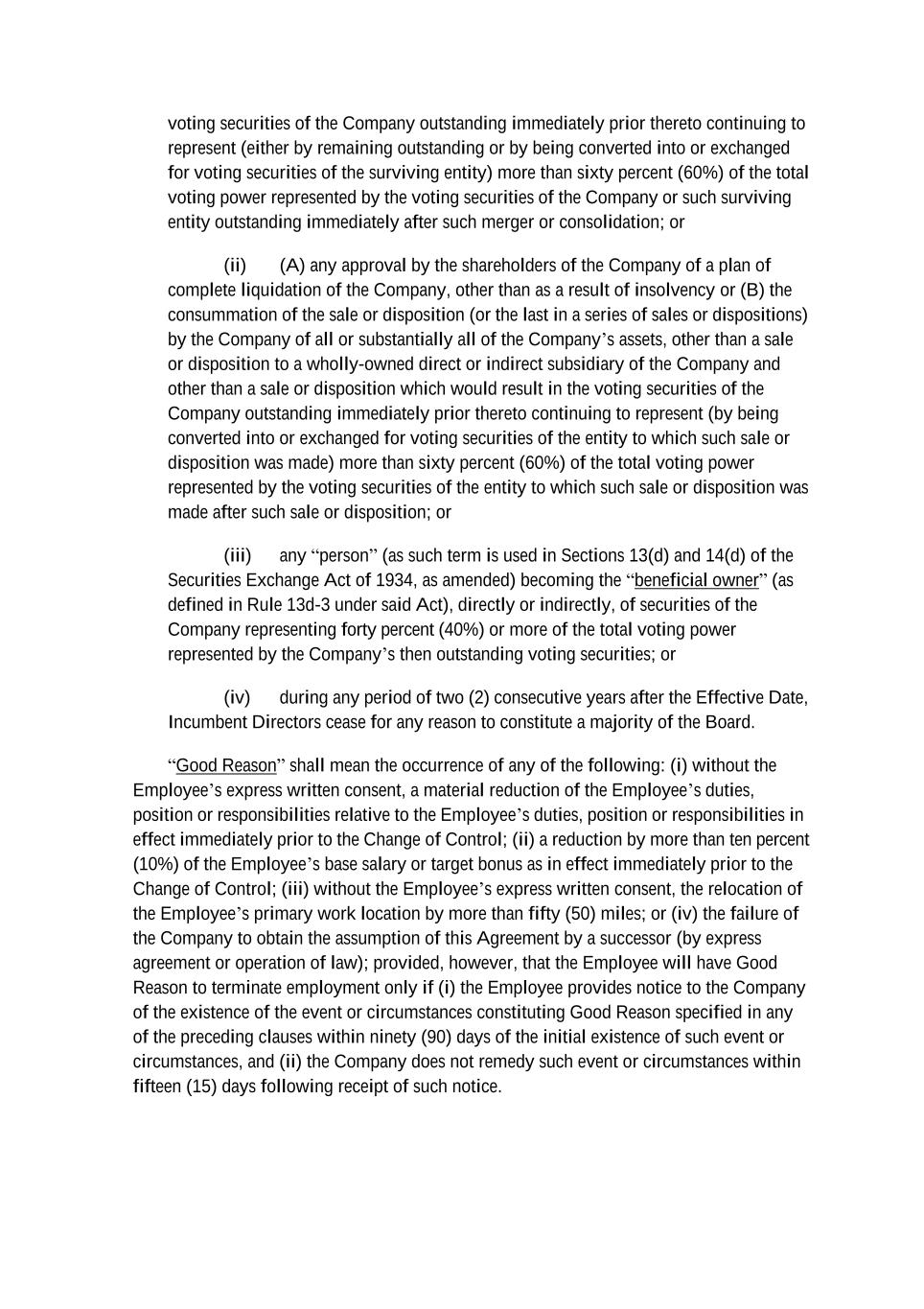
voting securities of the Company outstanding immediately prior thereto continuing to represent (either by remaining outstanding or by being converted into or exchanged for voting securities of the surviving entity) more than sixty percent (60%) of the total voting power represented by the voting securities of the Company or such surviving entity outstanding immediately after such merger or consolidation; or (ii) (A) any approval by the shareholders of the Company of a plan of complete liquidation of the Company, other than as a result of insolvency or (B) the consummation of the sale or disposition (or the last in a series of sales or dispositions) by the Company of all or substantially all of the Company’s assets, other than a sale or disposition to a wholly-owned direct or indirect subsidiary of the Company and other than a sale or disposition which would result in the voting securities of the Company outstanding immediately prior thereto continuing to represent (by being converted into or exchanged for voting securities of the entity to which such sale or disposition was made) more than sixty percent (60%) of the total voting power represented by the voting securities of the entity to which such sale or disposition was made after such sale or disposition; or (iii) any “person” (as such term is used in Sections 13(d) and 14(d) of the Securities Exchange Act of 1934, as amended) becoming the “beneficial owner” (as defined in Rule 13d-3 under said Act), directly or indirectly, of securities of the Company representing forty percent (40%) or more of the total voting power represented by the Company’s then outstanding voting securities; or (iv) during any period of two (2) consecutive years after the Effective Date, Incumbent Directors cease for any reason to constitute a majority of the Board. “Good Reason” shall mean the occurrence of any of the following: (i) without the Employee’s express written consent, a material reduction of the Employee’s duties, position or responsibilities relative to the Employee’s duties, position or responsibilities in effect immediately prior to the Change of Control; (ii) a reduction by more than ten percent (10%) of the Employee’s base salary or target bonus as in effect immediately prior to the Change of Control; (iii) without the Employee’s express written consent, the relocation of the Employee’s primary work location by more than fifty (50) miles; or (iv) the failure of the Company to obtain the assumption of this Agreement by a successor (by express agreement or operation of law); provided, however, that the Employee will have Good Reason to terminate employment only if (i) the Employee provides notice to the Company of the existence of the event or circumstances constituting Good Reason specified in any of the preceding clauses within ninety (90) days of the initial existence of such event or circumstances, and (ii) the Company does not remedy such event or circumstances within fifteen (15) days following receipt of such notice.
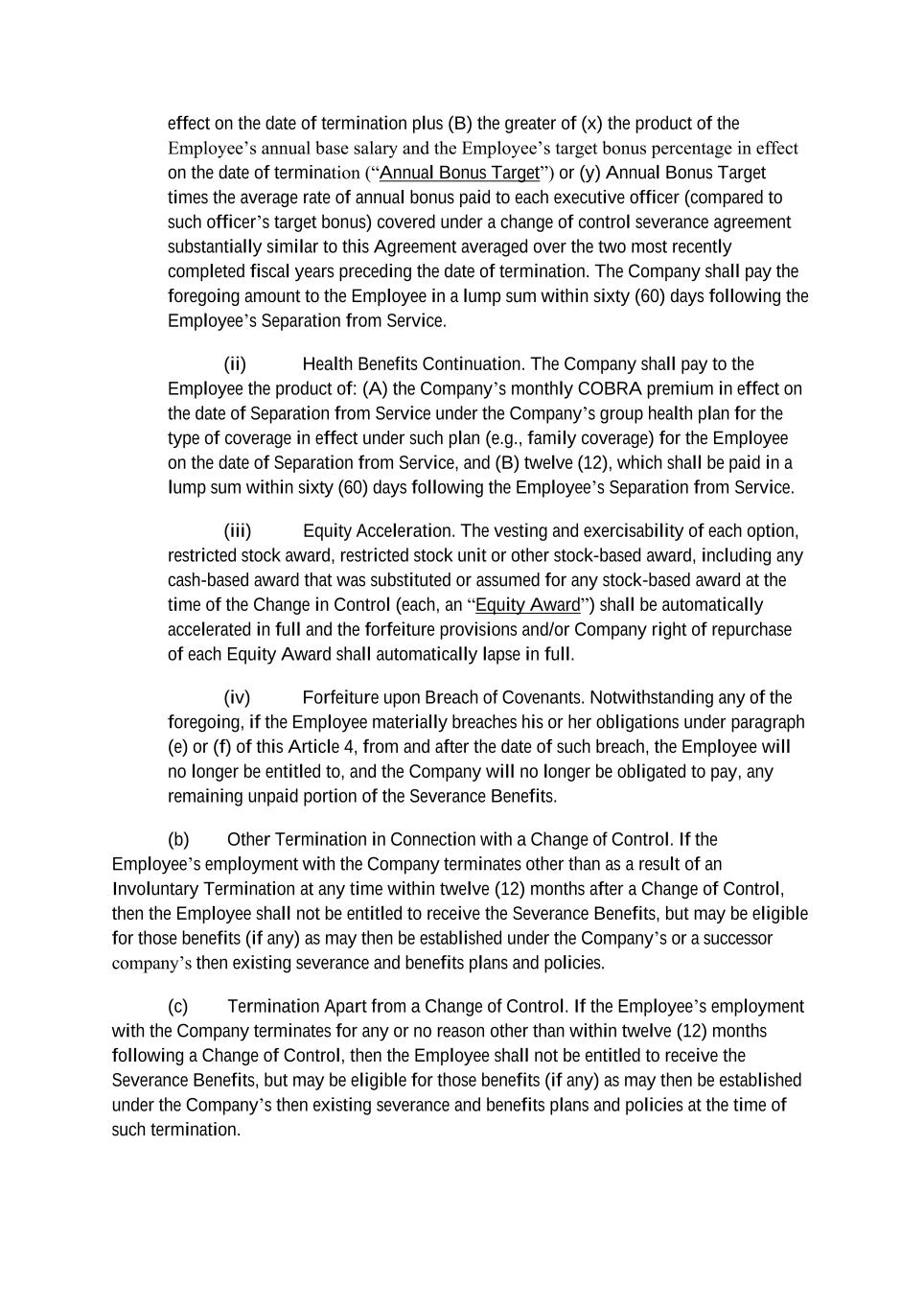
effect on the date of termination plus (B) the greater of (x) the product of the Employee’s annual base salary and the Employee’s target bonus percentage in effect on the date of termination (“Annual Bonus Target”) or (y) Annual Bonus Target times the average rate of annual bonus paid to each executive officer (compared to such officer’s target bonus) covered under a change of control severance agreement substantially similar to this Agreement averaged over the two most recently completed fiscal years preceding the date of termination. The Company shall pay the foregoing amount to the Employee in a lump sum within sixty (60) days following the Employee’s Separation from Service. (ii) Health Benefits Continuation. The Company shall pay to the Employee the product of: (A) the Company’s monthly COBRA premium in effect on the date of Separation from Service under the Company’s group health plan for the type of coverage in effect under such plan (e.g., family coverage) for the Employee on the date of Separation from Service, and (B) twelve (12), which shall be paid in a lump sum within sixty (60) days following the Employee’s Separation from Service. (iii) Equity Acceleration. The vesting and exercisability of each option, restricted stock award, restricted stock unit or other stock-based award, including any cash-based award that was substituted or assumed for any stock-based award at the time of the Change in Control (each, an “Equity Award”) shall be automatically accelerated in full and the forfeiture provisions and/or Company right of repurchase of each Equity Award shall automatically lapse in full. (iv) Forfeiture upon Breach of Covenants. Notwithstanding any of the foregoing, if the Employee materially breaches his or her obligations under paragraph (e) or (f) of this Article 4, from and after the date of such breach, the Employee will no longer be entitled to, and the Company will no longer be obligated to pay, any remaining unpaid portion of the Severance Benefits. (b) Other Termination in Connection with a Change of Control. If the Employee’s employment with the Company terminates other than as a result of an Involuntary Termination at any time within twelve (12) months after a Change of Control, then the Employee shall not be entitled to receive the Severance Benefits, but may be eligible for those benefits (if any) as may then be established under the Company’s or a successor company’s then existing severance and benefits plans and policies. (c) Termination Apart from a Change of Control. If the Employee’s employment with the Company terminates for any or no reason other than within twelve (12) months following a Change of Control, then the Employee shall not be entitled to receive the Severance Benefits, but may be eligible for those benefits (if any) as may then be established under the Company’s then existing severance and benefits plans and policies at the time of such termination.
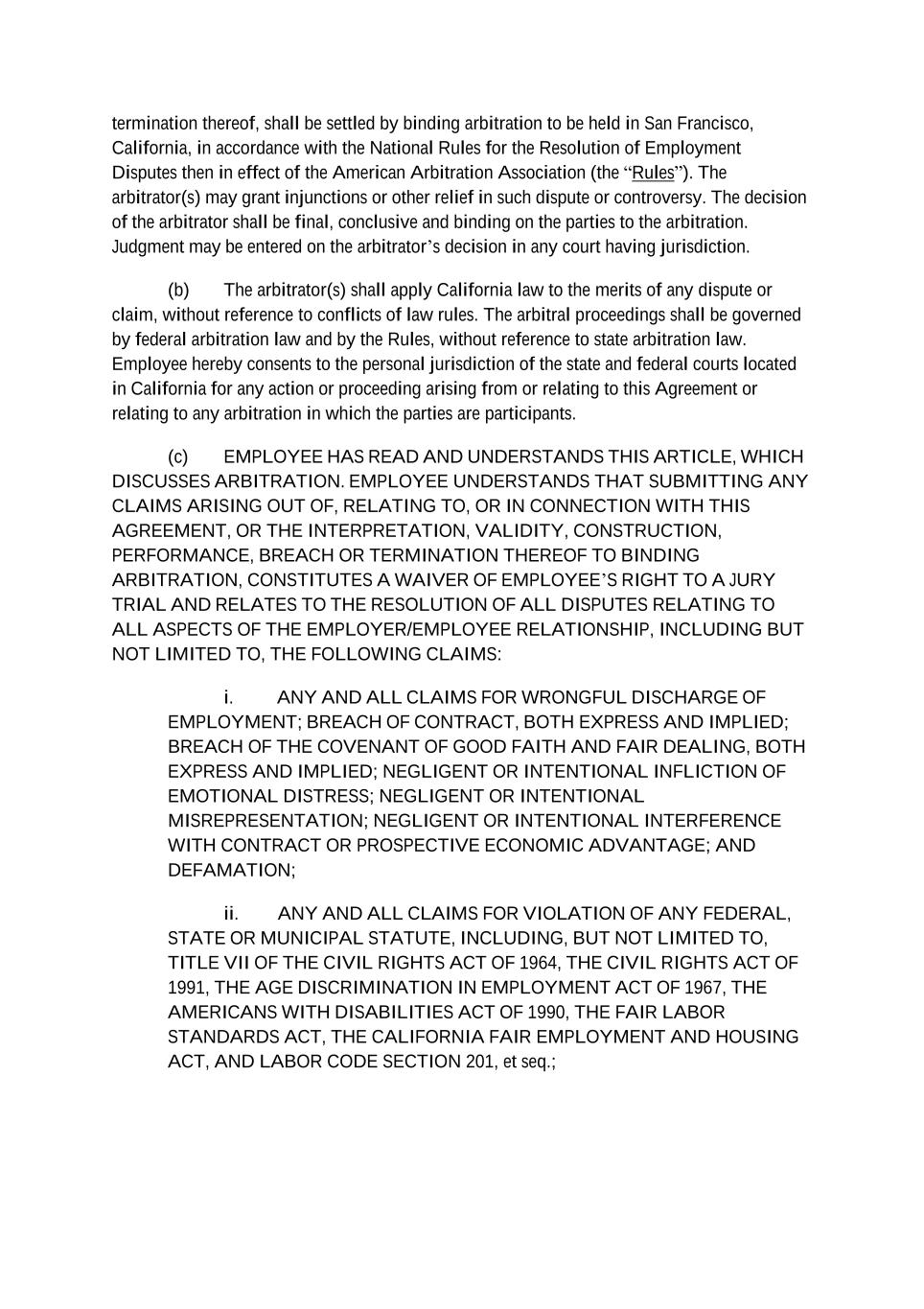
termination thereof, shall be settled by binding arbitration to be held in San Francisco, California, in accordance with the National Rules for the Resolution of Employment Disputes then in effect of the American Arbitration Association (the “Rules”). The arbitrator(s) may grant injunctions or other relief in such dispute or controversy. The decision of the arbitrator shall be final, conclusive and binding on the parties to the arbitration. Judgment may be entered on the arbitrator’s decision in any court having jurisdiction. (b) The arbitrator(s) shall apply California law to the merits of any dispute or claim, without reference to conflicts of law rules. The arbitral proceedings shall be governed by federal arbitration law and by the Rules, without reference to state arbitration law. Employee hereby consents to the personal jurisdiction of the state and federal courts located in California for any action or proceeding arising from or relating to this Agreement or relating to any arbitration in which the parties are participants. (c) EMPLOYEE HAS READ AND UNDERSTANDS THIS ARTICLE, WHICH DISCUSSES ARBITRATION. EMPLOYEE UNDERSTANDS THAT SUBMITTING ANY CLAIMS ARISING OUT OF, RELATING TO, OR IN CONNECTION WITH THIS AGREEMENT, OR THE INTERPRETATION, VALIDITY, CONSTRUCTION, PERFORMANCE, BREACH OR TERMINATION THEREOF TO BINDING ARBITRATION, CONSTITUTES A WAIVER OF EMPLOYEE’S RIGHT TO A JURY TRIAL AND RELATES TO THE RESOLUTION OF ALL DISPUTES RELATING TO ALL ASPECTS OF THE EMPLOYER/EMPLOYEE RELATIONSHIP, INCLUDING BUT NOT LIMITED TO, THE FOLLOWING CLAIMS: i. ANY AND ALL CLAIMS FOR WRONGFUL DISCHARGE OF EMPLOYMENT; BREACH OF CONTRACT, BOTH EXPRESS AND IMPLIED; BREACH OF THE COVENANT OF GOOD FAITH AND FAIR DEALING, BOTH EXPRESS AND IMPLIED; NEGLIGENT OR INTENTIONAL INFLICTION OF EMOTIONAL DISTRESS; NEGLIGENT OR INTENTIONAL MISREPRESENTATION; NEGLIGENT OR INTENTIONAL INTERFERENCE WITH CONTRACT OR PROSPECTIVE ECONOMIC ADVANTAGE; AND DEFAMATION; ii. ANY AND ALL CLAIMS FOR VIOLATION OF ANY FEDERAL, STATE OR MUNICIPAL STATUTE, INCLUDING, BUT NOT LIMITED TO, TITLE VII OF THE CIVIL RIGHTS ACT OF 1964, THE CIVIL RIGHTS ACT OF 1991, THE AGE DISCRIMINATION IN EMPLOYMENT ACT OF 1967, THE AMERICANS WITH DISABILITIES ACT OF 1990, THE FAIR LABOR STANDARDS ACT, THE CALIFORNIA FAIR EMPLOYMENT AND HOUSING ACT, AND LABOR CODE SECTION 201, et seq.;
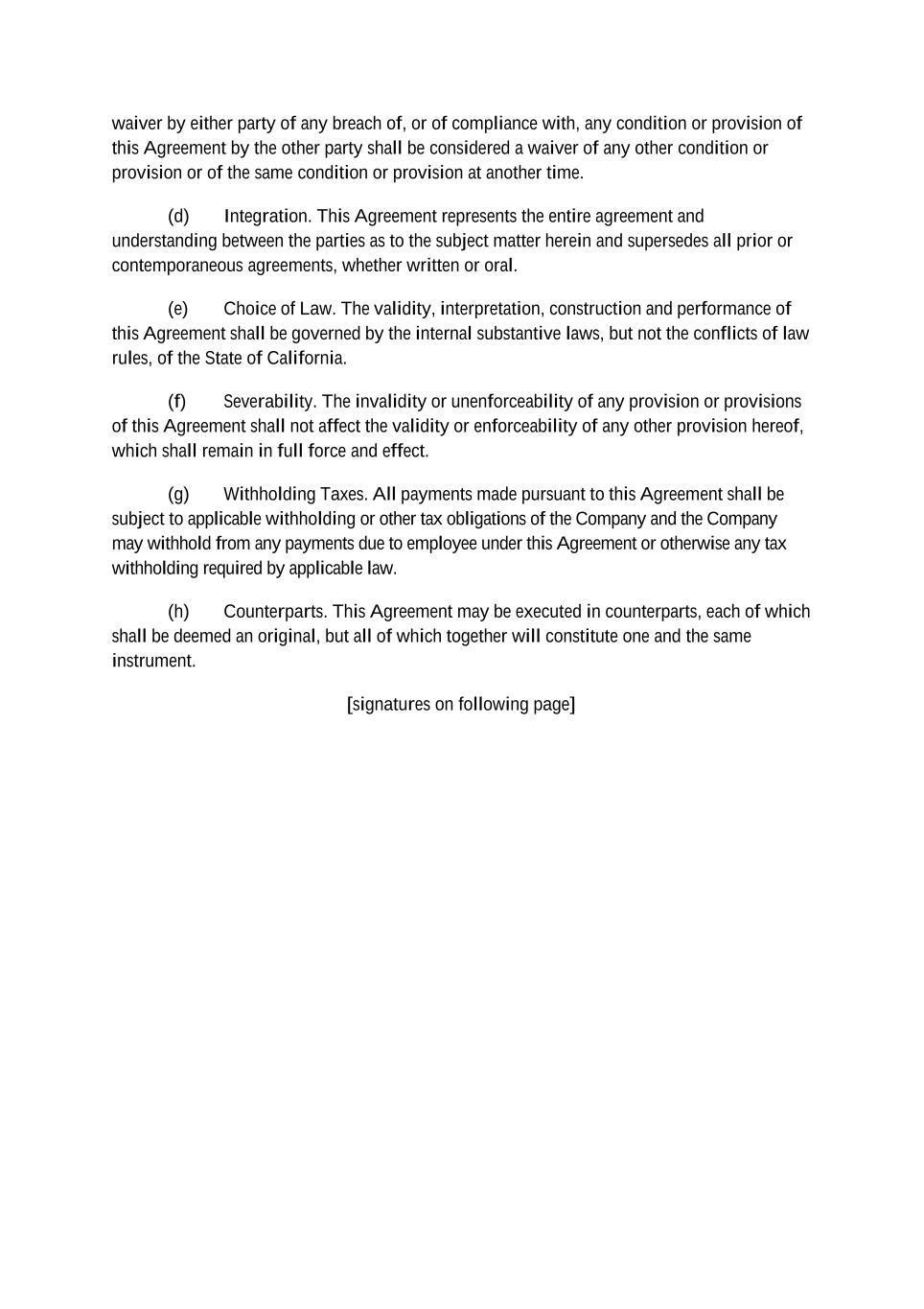
waiver by either party of any breach of, or of compliance with, any condition or provision of this Agreement by the other party shall be considered a waiver of any other condition or provision or of the same condition or provision at another time. (d) Integration. This Agreement represents the entire agreement and understanding between the parties as to the subject matter herein and supersedes all prior or contemporaneous agreements, whether written or oral. (e) Choice of Law. The validity, interpretation, construction and performance of this Agreement shall be governed by the internal substantive laws, but not the conflicts of law rules, of the State of California. (f) Severability. The invalidity or unenforceability of any provision or provisions of this Agreement shall not affect the validity or enforceability of any other provision hereof, which shall remain in full force and effect. (g) Withholding Taxes. All payments made pursuant to this Agreement shall be subject to applicable withholding or other tax obligations of the Company and the Company may withhold from any payments due to employee under this Agreement or otherwise any tax withholding required by applicable law. (h) Counterparts. This Agreement may be executed in counterparts, each of which shall be deemed an original, but all of which together will constitute one and the same instrument. [signatures on following page]

